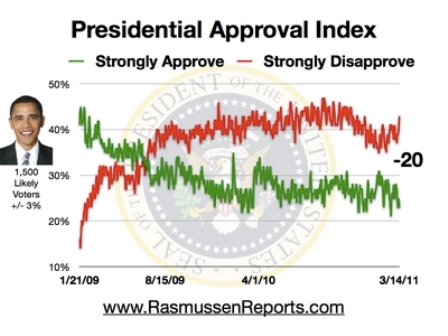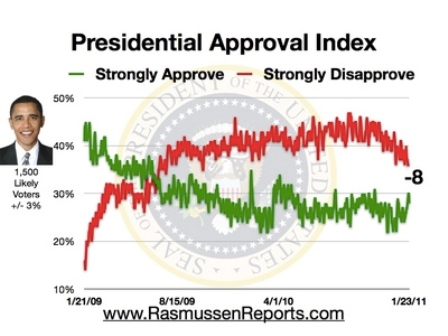In a bold move to the right, President Obama proposed a series of Republican type business tax cuts that would not have been the first choice of anyone on the left, in addition to a tax cut for workers earning less than $250,000 per year.
Boehner’s best move would have been to embrace the business tax cuts as well as the personal tax cuts, declare victory, and claim it was voter rejection of the ‘liberal agenda’ that caused the President to break ranks with the left and join the conservative cause, etc. And I’m sure he could have spun it far better than my feeble attempt.
Instead, Boehner fell into the trap, as he rejected the entire pro Republican agenda proposal, and opened himself and the Republican party up to a crushing condemnation of his position by a President who was back to his teleprompter led candidate form.
Looks like a major political blunder to me. While Obama’s proposals can be said to fall short of the mark, there was precious little the Republicans should have been objecting to. Now Boehner is stranded in no man’s land, regrouping and groping for a position that makes sense. (Reminds me of the Arafat’s public relations disaster when he rejected a far more than generous offer from the Israelis.)
Unfortunately, Obama took advantage of and reinforced the anti deficit fear mongering and added to that fear mongering, claiming he didn’t extend tax cuts to the rich because the govt. needs those dollars for deficit reduction. This further sets us up for higher unemployment down the road and has already limited any fiscal response to levels that will keep US unemployment ‘high for long.’
Now the Democrats are hoping that the numbers between now and the election show a double dip is not in the cards, and that things have slowly turned, which is very possible.
Even so, there’s a good chance it’s too late to stem the anti incumbent tide.
September 8 (AP) — President Barack Obama strongly defended his opposition to extending Bush-era tax breaks for the wealthiest Americans on Wednesday and delivered a searing attack on Republicans and their House leader for advocating “the same philosophy that led to this mess in the first place.”
Obama said the struggling U.S. economy can’t afford to spend $700 billion to keep lower tax rates in place for the nation’s highest earners despite a call by House Minority Leader John Boehner and other GOP leaders to do just that.
Speaking in the same city where Boehner, an Ohio Republican, recently ridiculed Obama’s economic stewardship, Obama said Boehner’s policies amount to no more than “cut more taxes for millionaires and cut more rules for corporations.”
Obama’s comments came as the administration rolled out new proposals designed to re-ignite a sputtering recovery, including new tax breaks for businesses and $50 billion for U.S. roads, rails and airports.
“Let me be clear to Mr. Boehner and everyone else. We should not hold middle class tax cuts hostage any longer,” the president said. The administration “is ready this week to give tax cuts to every American making $250,000 or less,” he said.
Actually, Obama and other Democratic leaders want to extend the tax cuts except for individuals making over $200,000 a year—or families earning over $250,000. The sweeping series of Bush tax cuts expires at the end of this year unless Congress renews them.
Obama went after Boehner—who would probably become House speaker if Republicans win control of the House in November’s midterm elections—directly by name.
In Boehner’s remarks on Aug. 24, Obama said, the Republican leader offered “no new ideas. There was just the same philosophy we already tried for the last decade, the same philosophy that led to this mess in the first place.”
Ahead of Obama’s speech, Boehner offered his own proposals on Wednesday, saying in a morning broadcast interview that Congress should freeze all tax rates for two years and should cut federal spending to the levels of 2008, before the deep recession took hold.
“People are asking, ‘Where are the jobs?”‘ Boehner said, calling the White House “out of touch” with the American public.
Obama gave one of his strongest pitches yet on allowing the Bush tax cuts to expire at the end of this year for wealthy Americans but allowing them to remain in place for everybody else.
Republicans, and even some Democrats, have suggested that it was no time to raise taxes on anybody, given the fragile state of the economy.
The debate is an unwelcome one for dozens of vulnerable Democratic incumbents just weeks before Election Day. Already, a handful of Democrats in conservative or swing districts, such as Reps. Gerry Connolly in the northern Virginia suburbs of Washington, D.C., and Bobby Bright in southeastern Alabama, have come out publicly for extending all the cuts—at least temporarily.
Still other embattled Democrats, wary of alienating middle-class voters, are siding with Obama. In central Ohio, for example, Rep. Mary Jo Kilroy has said the tax cuts for higher earners should be repealed, but middle-income people should see no tax increases.
Obama acknowledged that the recovery that began in late 2009 had slowed considerably.
“And so people are frustrated and angry and anxious about the future. I understand that. I also understand that in a political campaign, the easiest thing for the other side to do is ride this fear and anger all the way to Election Day,” he said.
“The middle class is still treading water, while those aspiring to reach the middle class are doing everything they can to keep from drowning,” Obama said.
Polls have shown a steady slippage in Obama’s approval ratings and an accompanying rise in Republican prospects for winning House and Senate seats in November.
In his speech, Obama outlined plans to expand and permanently extend a research and development tax credit that lapsed in 2009, to allow businesses to write 100 percent of their investments in equipment and plants off their taxes through 2011 and to pump $50 billion into the economy for highway, rail, airport and other infrastructure projects.
He also renewed a pitch for a small business package that has been stalled in the Senate because of Republican delaying tactics.
Of the debate over the expiring Bush tax cuts, Obama said, “I believe we ought to make the tax cuts for the middle class permanent. These families are the ones who saw their wages and incomes flatline over the last decade—and they deserve a break. And because they are more likely to spend on basic necessities, this will strengthen the economy as a whole.”
“But the Republican leader of the House doesn’t want to stop there. … He and his party believe we should also give a permanent tax curt to the wealthiest 2 percent of Americans.” Obama said these taxpayers were “folks who are less likely to spend the money” to help the economy grow, a notion disputed by Republicans and conservative economists.
Even Obama’s former budget director, Peter Orszag, has said that while he prefers Obama’s proposal to impose the higher taxes on the wealthy, getting such a formulation through Congress in this politically charged time might be extremely difficult. Orszag suggested a compromise—extend all the tax cuts, but just for two years, and then let them all expire.
Obama is strongly opposed to such a deal, White House officials said.



